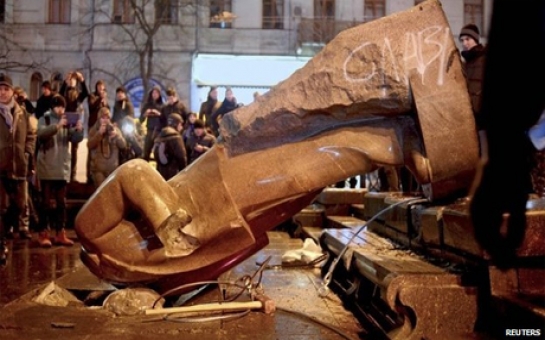As protesters gathered in the Ukrainian capital Kiev in late November, the authorities in Vietnam probably gave little thought to a story unfolding thousands of miles away, BBC reported.The blockade by protesters angry at a government U-turn on a free trade deal with the EU was widely covered in the Vietnamese press and proved a popular subject on social media.But everything changed in Vietnam when the statue of Vladimir Lenin came crashing down in Kiev.On Sunday a group of protesters smashed and dismembered the city's statue of the Russian revolutionary leader.
Transgression too far?As was to be expected, the news was quickly and widely reported on all major websites in Vietnam.On the BBC Vietnamese website, it went straight to the most read spot, proving even more popular than coverage of the death of Mandela and protests in Thailand.But within 24 hours, all that changed in Vietnam - there was soon no trace to be found of articles mentioning the toppling of Lenin. State media coverage of Ukraine's continuing unrest was subdued.
The most plausible explanation - say many analysts - is that the toppling of the statue of the revolutionary struck a nerve in Vietnam's Communist government.

Where previously authorities saw little harm in fairly neutral coverage of a country so far away, the fate of the carved and polished red Labrodorite Lenin was a transgression too far and they suddenly developed cold feet.The Soviet leader is still revered by the ruling Communist Party in Vietnam, where his birthday is still celebrated each year.It may well have been an unwelcome reminder of countless statues of Lenin and other Soviet leaders being brought down as the former Soviet Union collapsed.Vietnam has its own notable statue. A 5.2m-high (18ft) bronze figure of Vladimir Ilyich Lenin on a 2.7m marble pedestal peers down at passers-by in central Hanoi.The statue was given to Vietnam by the Soviet Union in 1982. It overlooks some of Hanoi's most important sights.Lenin has become very much part of the landscape and few of those strolling through the park he is placed in would give him much thought.The official Vietnam News Agency described those who knocked down the statue as "extremists".Meanwhile, Thanh Nien, a major newspaper in Ho Chi Minh City, said "hundreds of thousands of anti-government protesters" toppled the statue of the founder of the Soviet Union. Its tone of disapproval was similar.
Cyber silenceThen the state media machine kicked in. After all, statues of Vietnam's own communist revolutionary leader Ho Chi Minh are also to be found in cities around the country.There was cyber silence in Vietnam as articles were pulled from the websites.On Google, when one clicked on the headlines, one would be notified of "errors" - although many articles could still be found via Google Cache.The BBC was told that editors at some newspapers received "instruction on telephones" from the Ideological Department of the Communist Party, which enforces media censorship and control in Vietnam.But once news came out that the story had been censored, Vietnamese on social media started to become aware of just how sensitive the party was to that particular story.It is actually when the stories disappeared that people began to notice."Politicians and leaders should learn to face the truth. You cannot hide everything any more," one user wrote on the BBC Vietnamese Facebook page.Indeed, had the authorities not become so fearful of news in Ukraine fuelling dissent in Vietnam, readers may well have glanced over the images of a fallen giant without giving a second thought to the bronze figure standing in Hanoi's Lenin Park.
ANN.Az
